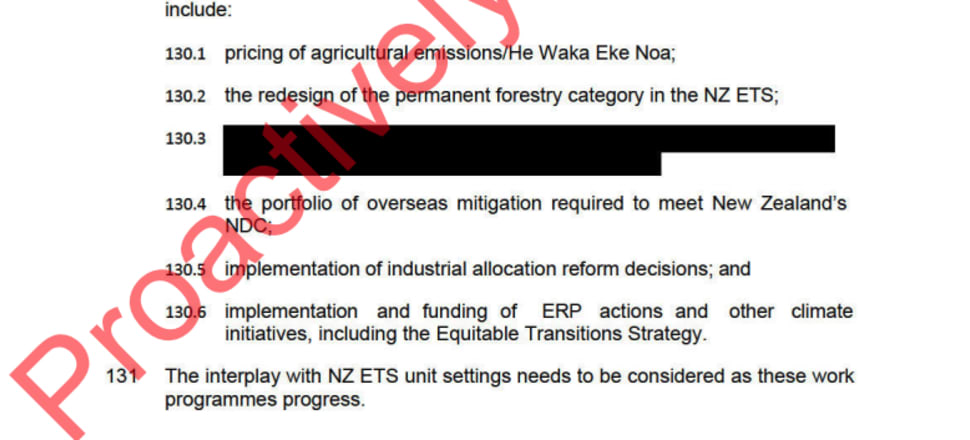
Official advice sheds light on a long-suspected loophole, in which the Government proactively releases material with redactions so it can circumvent freedom of information laws, Marc Daalder reports
Climate Change Minister James Shaw redacted parts of a Cabinet paper he released last year, even after officials advised him not to.
The paper predominately dealt with a decision on price controls in the Emissions Trading Scheme (ETS), which Shaw announced at the same time he released the document. But it also contained reference to an upcoming review of the ETS which Cabinet had yet to make final decisions on.
According to a separate briefing released to Newsroom under the Official Information Act (OIA), officials from the Ministry for the Environment told Shaw there were no valid grounds under the OIA to redact the reference to the ETS review. Releasing the paper would therefore effectively announce the review. Alternatively, they advised, Shaw could choose not to release the paper.

Instead, Shaw went a third way - releasing the Cabinet paper but redacting the mentions of the ETS review against official advice.
In a statement to Newsroom, he said he disagreed with that advice.
"It’s not unusual for a Minister to exercise discretion when it comes to information released in proactive releases. In this instance as Ministers were still taking part in regular conversations about the scope of the review and the spectrum of options to be considered as part of the review, it made sense to redact the document on the basis of 'active consideration'."
However, contrary to usual practice, the Cabinet paper that was ultimately released didn't specify the reasons for the redactions.
It is not unlawful for the Government to voluntarily release information with redactions that aren't consistent with the OIA. This is because the proactive release process is separate from the act.
But transparency advocates have long suspected proactive release is being used to circumvent the OIA, by redacting information which would have to be released in responding to an official request. Members of the public can still submit an OIA request for the redacted portions, but the process is likely to take weeks or months.
"It does highlight a problem with the interaction between proactive release and access under the OIA," Andrew Ecclestone, a senior associate at the Institute for Governance and Policy Studies at Victoria University of Wellington.
The Cabinet circular which governs proactive releases allows for redactions that go beyond the reasons allowed under the OIA, he added.
"Where that is the case, it should be the minister's office making very clear on the publication that they have applied reasons for the redaction which sit outside the OIA. If they don't explain that clearly, that's a problem with the operation of the policy."
Ecclestone said one solution is to bring proactive release into the Official Information Act, allowing people to go directly to the Ombudsman to challenge redactions on proactively released documents rather than having to go through the rigamarole of submitting another request.
Thomas Beagle, chair of the New Zealand Council for Civil Liberties, said the Government shouldn't get acclaim for proactively releasing information if it then censors that information when it's politically convenient.
"That's not in the spirit of the OIA. The whole point of open government and the OIA is that we're entitled to this information and to a certain extent, government should be operating in public," he said.
"When people look at redactions, your assumption would be that they would have to be OIA-style redactions, they're not just done for other reasons. It's obvious that something has gone wrong."







